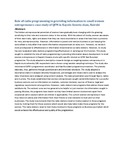| dc.description.abstract | The hidden entrepreneurial potentials of women have gradually been changing with the growing sensitivity to their role and economic status in the society. With the advent of media, women are aware of their own traits, rights and aware that they can move boundaries in areas that have been a preserve for men; entrepreneurship. However, information is power and venture business or just keeping the same afloat is risky affair that needs information empowerment at every turn. However, no media is more predisposed to effectiveness in information dissemination as radio stations. However, no study has ever evaluated radio stations programming effectiveness in carrying-out this function. This study sought to establish the role of radio programming in providing information about development to small women entrepreneurs in Kayole's Soweto slums with specific interest on QFM Kazi Burudani programme. The study adopted a descriptive research design on targeting women entrepreneurs in Kayole slums whereby 100 respondents were chosen using random sampling technique.
The study also interviewed QFM's programmes coordinator and Kazi Burudani programme presenters. The primary data was, thus, gathered through questionnaire and interview schedules. The study adopted a descriptive statics in analysis whereby frequencies, percentages and means were used to analyze the data. Interviews were analyzed using content analysis. The data presentation was through figure, tables and in prose. The study established that women entrepreneurs sought varied information for successful business venture such as information on markets, customer demand, sources of finance, legal and regulatory requirements among others. However, radio stations lack programs that address these needs satisfactorily. The existent ones are too general to be helpful or just mention the information sought in passing. Besides, the programs have dearth as they have limited women involvement apart from occasional call-in sessions which are limited in applicability. The current women entrepreneurs have thus relied on advice and information from their friends or oral networks to start and run their businesses. The study recommends that the radio stations need to involve women in these programs more by inviting them for these sessions which would also help tailor-make these programs for the women. The radio stations need to train those involved in these programs on business journalism which would enhance the effectiveness and quality of the programmes. | en_US |

